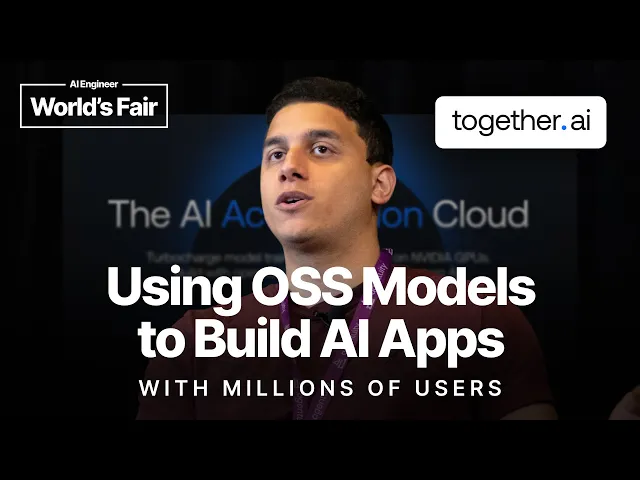Using OSS models to build AI apps with millions of users

Building AI apps that scale with open source models
In a world increasingly dominated by proprietary AI systems, Hassan El Mghari offers a refreshing counternarrative. His recent talk explores how open source models can power applications serving millions of users while maintaining sustainable economics. As businesses contemplate their AI strategy, El Mghari's insights provide a compelling case for considering open source alternatives alongside the dominant proprietary options from OpenAI and Anthropic.
El Mghari draws from his experience at Replit, where their AI coding assistant "Ghostwriter" serves millions of developers. His presentation walks through the practical considerations of building AI applications at scale, challenging the conventional wisdom that only proprietary models can deliver sufficient performance for production applications. The economics he presents are particularly striking: serving millions of users with proprietary models could bankrupt many startups, while open source alternatives offer a path to sustainability.
- Open source models have rapidly improved, now matching or exceeding proprietary alternatives for many specific use cases while offering significantly better economics
- Fine-tuning smaller models on domain-specific data often outperforms larger general-purpose models, especially for specialized tasks
- Thoughtful system design—combining retrieval augmented generation, multiple specialized models, and effective prompting—can create exceptional user experiences without relying on the largest models
The economics revolution of open source AI
Perhaps the most compelling insight from El Mghari's talk is the stark economic contrast between proprietary and open source models. When he demonstrates that serving 5 million monthly users with GPT-4 could cost a staggering $10 million per month versus just $50,000 with an open source alternative, the business implications become impossible to ignore.
This matters enormously in our current business climate. As companies race to integrate AI capabilities, many are building their strategies around expensive proprietary APIs without fully exploring alternatives. For startups, this decision could mean the difference between sustainability and burning through venture funding at an alarming rate. For enterprises, it represents potential cost savings of millions while maintaining control over their AI infrastructure.
The economic advantages extend beyond direct costs. El Mghari notes that open source models allow for local deployment, reducing latency and eliminating data privacy concerns that come with sending information to third-party APIs. This infrastructure flexibility creates strategic advantages that purely API-based approaches cannot match.
Beyond the obvious:
Recent Videos
How To Earn MONEY With Images (No Bullsh*t)
Smart earnings from your image collection In today's digital economy, passive income streams have become increasingly accessible to creators with various skill sets. A recent YouTube video cuts through the hype to explore legitimate ways photographers, designers, and even casual smartphone users can monetize their image collections. The strategies outlined don't rely on unrealistic promises or complicated schemes—instead, they focus on established marketplaces with proven revenue potential for image creators. Key Points Stock photography platforms like Shutterstock, Adobe Stock, and Getty Images remain viable income sources when you understand their specific requirements and optimize your submissions accordingly. Specialized marketplaces focusing...
Oct 3, 2025New SHAPE SHIFTING AI Robot Is Freaking People Out
Liquid robots will change everything In the quiet labs of Carnegie Mellon University, scientists have created something that feels plucked from science fiction—a magnetic slime robot that can transform between liquid and solid states, slipping through tight spaces before reassembling on the other side. This technology, showcased in a recent YouTube video, represents a significant leap beyond traditional robotics into a realm where machines mimic not just animal movements, but their fundamental physical properties. While the internet might be buzzing with dystopian concerns about "shape-shifting terminators," the reality offers far more promising applications that could revolutionize medicine, rescue operations, and...
Oct 3, 2025How To Do Homeless AI Tiktok Trend (Tiktok Homeless AI Tutorial)
AI homeless trend raises ethical concerns In an era where social media trends evolve faster than we can comprehend them, TikTok's "homeless AI" trend has sparked both creative engagement and serious ethical questions. The trend, which involves using AI to transform ordinary photos into images depicting homelessness, has rapidly gained traction across the platform, with creators eagerly jumping on board to showcase their digital transformations. While the technical process is relatively straightforward, the implications of digitally "becoming homeless" for entertainment deserve careful consideration. The video tutorial provides a step-by-step guide on creating these AI-generated images, explaining how users can transform...
